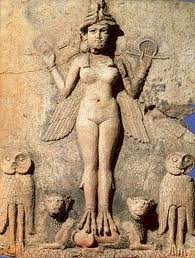The Queen of Heaven
Inanna, “The Queen of Heaven,” is a goddess of Sumerian origin: goddess of warfare, fertility, and sexual love. The Akkadians called her Ishtar, a name from which Easter was derived.
Yes, the Christian holiday.
Inanna is the most popular and important female deity in ancient Mesopotamia. She is also known as a healer, life giver, composer of songs, and possessing a wide range of emotions—passionate, ambitious, jealous, grieving, joyful, timid, and generous. In later cultures, she went by different names: Astarte, Isis, Aphrodite—she was the Goddess.
She is the original femme fatale, the embodiment of the woman every man dreams about; the female that devours men, the female that attracts/scares men; the virgin harlot.
Every man knows at least one.
The goddess makes an appearance in Neil Gaiman’s “American Gods.”
Throughout Sumer’s existence, her powers and deeds were glorified and extolled in myth, epic, and hymn. No one dared oppose her, neither god nor man. She was as willful as she was beautiful, as selfish as she was generous.
At the beginning of her career as a goddess (around 3000 BC), she took over the divine rulership of an important Sumerian city, Uruk, from the powerful Anu (or An), the god of heaven, also the chief god of Sumer. She sought to make Uruk the center of civilized life; to do that, the goddess had to go on a dangerous journey to Abzu, the “Deep,” guarded by Enki, its king.
This same Enki also inadvertently insulted the goddess when he organized the universe; he somehow failed to assign her the insignia and prerogatives Inanna felt was her due. Even then, no one can do that to the goddess and escape her wrath; he received a dressing down of divine proportions that he had to apologize contritely, and did some very “un-godlike” groveling before her.
She is also known to have punished cities that refused to acknowledge her as Queen.
However, the role that undoubtedly pleased the goddess the most, the role that guaranteed her the affection of every Sumerian, was her role in the “Sacred Marriage” rite—the celebration of her sexual union with the King of Sumer. This rite was said to ensure the fertility of the soil.
Dumuzi (known as Tammuz in the Bible) was the first king whom the goddess chose to be her mortal spouse. Subsequent kings of Sumer celebrated their marriage to the goddess as incarnations of Dumuzi.
With the advent of monotheism, however, goddess worship died out, although some might say not completely.
Inanna is still a powerful role model for today’s women—goddess, earth mother, protectress, sensuous, intelligent, beautiful, powerful.
Confident of her position in the world, she is acutely aware of her great responsibility and does not shirk from it. She embraces it, revels in it.
Sort of like Penelope Cruz crossed with Hillary Clinton.
My Lady looksin sweet wonder from heaven.The people of Sumer paradebefore the holy Inanna.Inanna, the Lady of the Morning,is radiant.I sing your praises, Holy Inanna.The Lady of the Morningis radiant on the horizon.





Comments
Post a Comment
So, what do you think? Post it here: